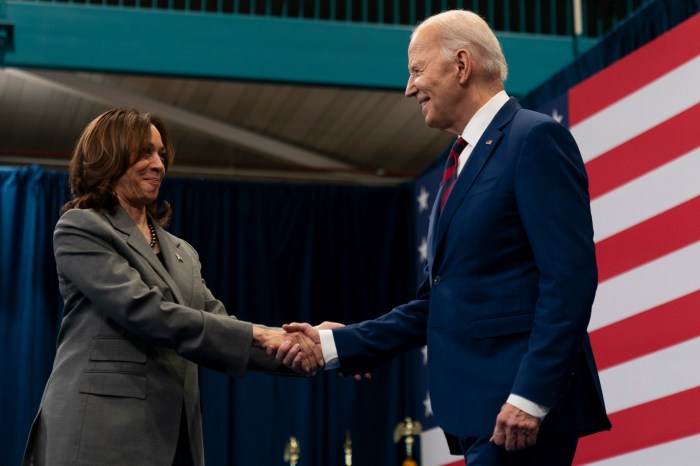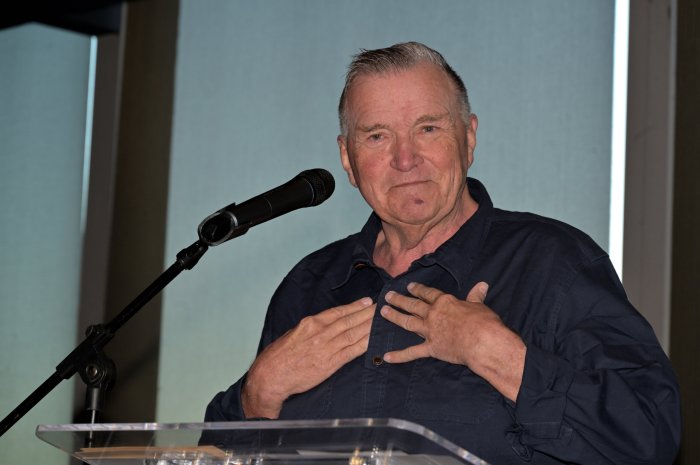A week after the New York State Assembly’s passage of a transgender civil rights law — for the fifth time — roughly 550 LGBT community advocates descended on Albany on May 8 for the Empire State Pride Agenda’s (ESPA) annual Equality & Justice lobbying day.
A key goal was to push the Republican State Senate majority –– which last June allowed a vote on marriage equality and provided four supporters critical to its success –– to break the logjam that has stalled the Gender Expression Non-Discrimination Act for nearly a decade.
“GENDA is our number one priority,” said Lynn Faria, ESPA’s interim executive director.
Faria declined to name or speculate on specific GOP targets who could be enlisted, in turn, to press their party to bring the bill up for a floor vote, but said, “We are looking at a broader educational effort. We are continuing to engage the Senate majority to make sure that the voices of the 78 percent of New Yorkers who support the bill are heard and to bring the stories of discrimination against transgender people to the senators.”
GENDA, sponsored by Senator Daniel Squadron, a Lower Manhattan/ Brownstone Brooklyn Democrat who this year assumed leadership on the bill from out gay Chelsea Democrat Tom Duane, is currently in the Rules Committee, which is chaired by Majority Leader Dean Skelos, a Nassau County Republican. The measure will not advance to the floor unless the GOP majority caucus gives its okay. The Republicans’ deliberations on taking that step on gay marriage last June occasioned weeks of drama in Albany.
According to ESPA, participants held lobbying meetings in the offices of 176 legislators, though the group did not immediately have a breakout of how many of those were among the 62 senators or their staffs.
Ari More, a transgender woman from Buffalo, has been to Equality & Justice Day every May since 2003. Feeling comfortable with the commitment of her state senator, Democrat Tim Kennedy, to helping pass GENDA, she spent much of the day coordinating other participants as they shuttled from meeting to meeting.
Education remains a major component of the lobbying effort, she said. Some legislators and their staff voice confusion about why transgender civil rights protections are not protected under the 2002 Sexual Orientation Non-Discrimination Act (SONDA) — even though that bill was purposely written to not incorporate gender identity and expression into its language out of political considerations.
Still, More noted, Albany is now more welcoming of education on transgender issues than she has ever before witnessed.
A member of both Stonewall Democrats of Western New York and Spectrum of Western New York, a transgender support group, More said she and other trans activists across the state have been “steadfast” in supporting gay and lesbian goals over the past decade. She spoke at one of last year’s rallies in the weeks just prior to State Senate passage of the marriage equality bill.
With gender protections excluded from SONDA and then nine years passing with no state action on transgender rights –– only to see gay marriage leapfrog over that — More said, “Of course I have frustrations about that… I am demanding that my gay and lesbian brothers and sisters continue to stand with us.”
So far, she said, she sees the activist commitment by the community still alive. She added, “Thank God we got DASA,” the Dignity for All Students Act, which created anti-bullying protections based on sexual orientation and gender expression, among other categories. “At least the trans kids can be safe.”
GENDA’s passage in the Assembly on April 30, led by Chelsea Democrat Dick Gottfried, was a routine affair, with two Republicans and one Independent joining 78 Democrats in an 81-59 victory. Those voting no included 46 Republicans and 13 Democrats. The margin of victory in the Assembly likely understates the support for the measure there –– among the eight members who did not vote were seven Democrats, six of them from New York City.
The archives of the Pride Agenda’s website contain a 2009 scorecard based on public statements by those then serving in the Senate, which showed 34 votes in support of GENDA, two more than necessary for passage. That list included nearly all of the Democrats as well as seven Republicans who are still in office. Separate from that list, two other Republicans — Stephen Saland and Mark Grisanti — voted for marriage equality in 2011 and are likely targets in this year’s GENDA push.
Despite the upbeat 2009 handicapping, GENDA suffered a crippling setback in June 2010, when it failed to clear the Senate Judiciary Committee despite the fact that Democrats were then the majority party. With Bronx Democrat Ruben Diaz, an implacable foe of LGBT rights, on the committee, Majority Leader John Sampson of Brooklyn, who chaired Judiciary, relied on commitments from several Republicans that they would support the measure. When not a single GOP senator did so –– among Republican committee members, several were listed as yes votes in the previous year’s scorecard –– the bill was dead for the year.
A particularly disquieting aspect of that defeat was the way a Democratic committee staffer answered a GOP senator’s concerns about “men in dresses” entering women’s rooms. That staffer responded by asking the Republicans to consider what might happen to those “men in dresses” if they were required to use men’s rooms instead — accepting a misinformed framing of the gender identity and expression issue that has dogged transgender civil rights efforts in a number of legislatures around the nation.
Asked whether his colleagues in the Democratic caucus were up to speed in defending GENDA on its merits and countering the opposition’s scare tactics, Squadron said, “Everyone that I’m talking to is clear that this bill is about basic protections in housing, employment, and public accommodations for gender identity and expression, just like for so many other categories in the law.”
Squadron took a pass on talking about specific senators’ positions on GENDA, but rather said, “Look, the key is to get a vote, to force people to cast a vote on civil rights. My view is that if you force folks to take a vote on civil rights that a majority of the Senate will do the right thing. That is my belief and my hope.”
Several times, however, he emphasized that he did not have a list of yes votes in his pocket.
“I am not saying that I could assure you today that we have the votes,” Squadron said. “We have work to do to make sure we can get this done.”
Melissa Sklarz, a longtime transgender activist who is president of the Stonewall Democratic Club of NYC, noted that well over a dozen Republican senators –– including the 11 from Long Island and New York City –– represent communities that provide local nondiscrimination protections based on gender identity and expression.
However, Gay City News calls to seven Republican senators –– including Skelos, last year’s four marriage equality supporters, and several from Long Island and New York City –– seeking information on their positions on GENDA were not returned.
The posture of the Log Cabin Republicans toward moving GENDA this year may offer insight into how the GOP majority is currently looking at the issue. Asked his view of whether the measure stands, Gregory T. Angelo, chair of the New York State Log Cabin Republicans, wrote in an email, “We’re following the bill, but our priority this year is supporting the GOP Senators who made marriage a reality for all New Yorkers and making sure Republicans retain the majority in the Senate Chamber in November.”
Squadron argued that the key obstacle is intransigence on the GOP majority’s part to allowing a vote.
“Senator Skelos has worked to block Democratic bills in the Rules Committee,” he said. “He has not allowed a vote on 311 Democratic bills. GENDA has not seen the light of day.”
Parliamentary procedures that would allow members to move a bill to the floor without committee approval, he said, have been “flouted.”
In one sign that the GOP may at least be listening, however, a Pride Agenda spokesman, George True Simpson, noted that several of the group’s board members had a face-to-face sit-down Tuesday with Senator Tom Libous, the deputy majority leader.
Terri Smith-Caronia, who is responsible for public policy at Housing Works, the AIDS services group that has been a major player in the effort to enact GENDA, said that Skelos’ decision to send the measure to Rules rather than the Judiciary Committee “signals” his intention not to move it this year. A successful vote would be easier to achieve in Judiciary than in Rules, she said, given the committees’ membership.
Smith-Caronia said her group counts 31 yes votes, with 17 undecided and 13 opposed (she, too, would not discuss specific names). Though that tally puts the number of additional supporters needed to ensure passage at just one, she said that Governor Andrew Cuomo, long on record in favor of GENDA, would like to see four more senators come around before advocates press for a floor vote. The bill, she said, is “not one of the governor’s priorities” this year.
More, the Buffalo activist, said her understanding was that the governor would make GENDA an early priority in 2013, after this year’s elections are behind the Senate Senate.
Cuomo’s office did not respond to a request for comment.
Sklarz questioned why Skelos has any reason to fear a backlash from conservatives over allowing a GENDA floor vote.
“He allowed a vote on marriage and now he has a Senate map that counts cows more than people,” she said, referring to a redistricting plan widely thought to advantage upstate Republicans in holding on to their narrow 32-29 majority in November.
Squadron responded by saying “right” when asked about the GOP’s view that redistricting represented a win for them, but said that has not translated into any less resistance to letting Democratic bills move forward.
“Welcome to Albany,” he said. “There is a real discomfort with bipartisanship in Albany.”
Squadron, when asked about the prospects for the ESPA lobbying day advancing the issue, said most voters underestimate their ability to effect change in the Legislature.
“Again and again, people’s engagement with an issue and explaining the way it affects people’s lives, especially constituents’ lives, make a difference to senators,” he said.
Beyond its shoe of grassroots support on May 8, ESPA is relying on the same advisors –– Faria termed them the Dream Team –– employed in last year’s marriage push: lobbyists Mike Avella, a Republican, of Meara Avella Dickinson and Democrat Emily Giske from Bolton-St. John’s as well as communications consultant Jennifer Cunningham from SKDKnickerbocker.
Despite the work of ESPA, its professional advisors, Housing Works, the Human Rights Campaign, and activists traveling to Albany, Sklarz is wary about whether the effort is equal to the task.
“Legislators don’t seem to have the political will to act,” she said, while noting that “in the absence of any clear sign from the Legislature… the courts are starting to step in” –– both in New York and nationwide –– in decisions that interpret bias based on gender identity and expression as “sex discrimination.”
Last month, the Equal Employment Opportunity Commission, the federal agency with authority for interpreting the 1964 Civil Rights Act’s ban on sex discrimination, ruled that a “complaint of discrimination based on gender identity, change of sex, and/ or transgender status” can be pursued in federal courts on sex discrimination grounds.
The lack of any significant outcry against rulings like this, Sklarz argued, shows that frenzied responses in state legislatures to transgender civil rights measures are simply “political talking points.”
More said she senses that Albany legislators are beginning to understand that “nonsense” about bathrooms has been “a smokescreen, a distraction from talking about basic rights.”
According to Faria, those lobbying in Albany also pressed for continued funding for LGBT health and human services needs — including more money for homeless queer youth –– and “thanked” legislators and Governor Cuomo for enacting marriage equality last year. She noted the governor’s longstanding support for GENDA.
“He is publicly supportive of the bill, and we are incredibly grateful,” she said.





































